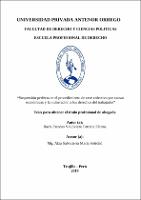Mostrar el registro sencillo del ítem
Suspensión perfecta en el procedimiento de cese colectivo por causas económicas y la vulneración a los derechos del trabajador.
| dc.contributor.advisor | Alza Salvatierra, María Soledad | |
| dc.contributor.author | Paredes Valdiviezo, Patricia Fátima | |
| dc.creator | Paredes Valdiviezo, Patricia Fátima | |
| dc.date.accessioned | 2019-03-15T17:11:04Z | |
| dc.date.available | 2019-03-15T17:11:04Z | |
| dc.date.issued | 2019 | |
| dc.identifier.uri | https://hdl.handle.net/20.500.12759/4551 | |
| dc.description.abstract | La presente investigación tiene por objetivo determinar la forma en que la suspensión perfecta de labores que se otorga de forma automática ante la solicitud del empleador en el procedimiento de cese colectivo por causas económicas vulnera los derechos del trabajador. De esta manera, se analizó la legislación laboral vigente, resoluciones administrativas emitidas por el Ministerio de Trabajo, y doctrina sobre la materia; utilizando los métodos de investigación analítico, sintético e inductivo, y métodos jurídicos como el hermenéutico, doctrinario, dialéctico y comparativo. Asimismo, se empleó el fichaje y el análisis de contenido como técnicas de recolección de datos, utilizando la ficha y el protocolo de análisis como instrumentos, respectivamente. - El contenido esencial del derecho del trabajo comprende no sólo la obligación del Estado de facilitar un puesto de trabajo, mediante apropiadas y oportunas políticas económicas y sociales, sino, igualmente, el derecho del trabajador a conservar su puesto de trabajo, salvo que medie una causa o motivo objetivo que justifique su separación. De acuerdo a los resultados la permanencia del trabajador en el empleo implica la enunciación de un principio de estabilidad en el empleo, concretizado, de manera limitada en la imposibilidad de ser despedido sin que concurra una justa causa; asimismo, el cese colectivo por causas económicas es una figura extintiva del vínculo laboral cuyo procedimiento se encuentra respaldado por la legislación laboral vigente, la misma que permite que, aún sin existir pronunciamiento resolutivo de la Autoridad Administrativa de Trabajo (AAT) sobre la existencia real o no de las causas objetivas invocadas por el empleador, se efectivice anticipadamente la suspensión perfecta de labores durante el período que dure el procedimiento, con la sola presentación de la solicitud. En la presente investigación se concluye que la suspensión perfecta de labores que se otorga de forma automática ante la solicitud del empleador en el procedimiento de cese colectivo por causas económicas vulnera los derechos del trabajador en el sentido que dicho mecanismo tiene como fin suspender las obligaciones del empleador para con sus trabajadores atentando contra su estabilidad laboral y su derecho de percibir una remuneración por la prestación de sus servicios, sin que se haya probado plenamente la existencia de la causa objetiva que justifique el cese colectivo.atricia Paredes Patricia Paredes | es_PE |
| dc.description.abstract | The objective of the present investigation is to determine the way in which the perfect suspension of work that is automatically granted in response to the employer's request in the collective dismissal procedure for economic reasons violates the worker's rights. In this way, current labor legislation, administrative resolutions issued by the Ministry of Labor, and doctrine on the matter were analyzed; using methods of analytical, synthetic and inductive research, and legal methods such as hermeneutics, doctrinaire, dialectic and comparative. Likewise, the signing and content analysis were used as data collection techniques, using the file and the analysis protocol as instruments, respectively. - The essential content of the right to work includes not only the obligation of the State to provide a job, through appropriate and timely economic and social policies, but also the right of the worker to keep his job, unless there is a cause or objective reason that justifies their separation. According to the results, the permanence of the worker in employment implies the enunciation of a principle of stability in employment, concretized, in a limited way in the impossibility of being dismissed without a just cause; likewise, the collective termination for economic reasons is an extinct figure of the labor link whose procedure is supported by the current labor legislation, which allows that, even without a resolution from the Labor Administrative Authority (AAT) on the real existence or not of the objective causes invoked by the employer, the perfect suspension of work is effected in advance during the period of the procedure, with the mere presentation of the application. In the present investigation it is concluded that the perfect suspension of work that is automatically granted at the request of the employer in the procedure of collective dismissal for economic reasons violates the rights of the worker in the sense that said mechanism is intended to suspend the obligations of the employer for his workers undermining their job stability and their right to receive remuneration for the provision of their services, without having fully proven the existence of the objective cause that justifies the collective dismissal | en_US |
| dc.description.uri | Tesis | es_PE |
| dc.format | application/pdf | es_PE |
| dc.language.iso | spa | es_PE |
| dc.publisher | Universidad Privada Antenor Orrego - UPAO | es_PE |
| dc.relation.ispartofseries | T_DERE_452 | |
| dc.rights | info:eu-repo/semantics/openAccess | es_PE |
| dc.source | Universidad Privada Antenor Orrego | es_PE |
| dc.source | Repositorio institucional - UPAO | es_PE |
| dc.subject | Cese colectivo | es_PE |
| dc.subject | Derecho laboral | es_PE |
| dc.subject | Suspensión perfecta de labores | es_PE |
| dc.title | Suspensión perfecta en el procedimiento de cese colectivo por causas económicas y la vulneración a los derechos del trabajador. | es_PE |
| dc.type | info:eu-repo/semantics/bachelorThesis | es_PE |
| thesis.degree.level | Título Profesional | es_PE |
| thesis.degree.grantor | Universidad Privada Antenor Orrego. Facultad de Derecho y Ciencias Políticas | es_PE |
| thesis.degree.name | Abogado | es_PE |
| thesis.degree.discipline | Derecho | es_PE |
Ficheros en el ítem
Este ítem aparece en la(s) siguiente(s) colección(es)
-
Derecho [428]

